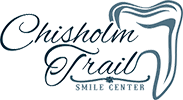If you recently had dentures placed at our Duncan, OK dental clinic, it may take time to adjust to the new prosthetics. Throughout the process, Dr. Matthew Bridges and our skilled team will help you with any questions or concerns that you may have.
Looking for restorative treatments in the Duncan area? Schedule a consultation with Dr. Bridges at Chisolm Trail Smile Center! We are proud to be one of the oldest dental practices in Duncan. If you are looking for a dental care home in Duncan, OK, call us today!
What Can I Do to Prevent My Dentures From Slipping?
If you find that your dentures often slip (unexpectantly shift), your prosthesis may need to be adjusted to better fit your gums. This is a common service that we offer for patients with new dentures. You may need to speak more slowly at first until you adjust to using your denture.
Finally, make sure that you are carefully following the instructions on the adhesive product you are using. Some patients tend to use too much adhesive. In general, only a small amount should be used.
My Dentures Slip When I Eat
Over time, eating will become easier as you adjust to your dentures. While there may be certain restrictions on your diet early on, most individuals are able to enjoy a normal diet. Try taking small bites of food and chewing slowly. Soft foods like yogurt and eggs will offer you the least amount of problems. When you do chew, use both sides of your mouth at once. Providing an even bite balance will help prevent uneven pressure on your dentures, which may cause undesirable movement or tipping.
How Do I Prevent Food From Becoming Trapped Under My Dentures?
One common complaint we hear from our patients is that food can become stuck under their dentures. Some patients benefit from “preparing” their dentures before they eat. To do this, close your teeth together and swallow to seal the dentures. Eating small bites while chewing thoroughly helps some patients. Certain types of foods (bread-based and uncooked vegetables) can be problematic. You may need to stray away from these food options when eating in public. Finally, if the problem persists, talk to Dr. Bridges about it at your next exam or check-up.
Other tips include:
- Practice speaking: There may be a learning curve as you learn to speak with your new dentures. Practicing reading out loud at home is one way to gain confidence when you speak in public.
- Stay hydrated: Dry mouth can complicated denture use. Drinking lots of water is good for your health in general, and it can help you adjust to your new dentures.
- Give your gums a rest: Sleeping without your dentures on is one way to ensure that your gums are not sore or irritated throughout the day.
Contact Our Office Today!
If you are experiencing complications with your new dentures, don’t worry. Many of our patients have to go through a short learning/adjustment period. By adjusting habits and behavior, and possibly having your denture adjusted, you can regain normal oral and speech function. Two of the best tips for adjusting to dentures is to keep your dentures clean and schedule visits to our office twice a year.
If you want to know the best dentist in the Velma or Duncan area, look no further than Dr. Matthew Bridges at Chisolm Trail Smile Center. Give us a call to schedule a consultation for dentures!







